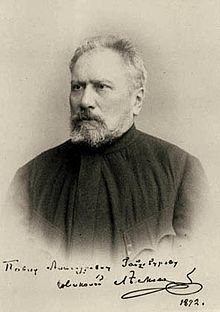The lady and the woman
The Lady and the Woman , also The Lady and the Woman ( Russian Дама и фефёла , Dama i fefjola ), is a short story by the Russian writer Nikolai Leskow , which appeared in the December 1894 issue of the Moscow magazine Russkaja Mysl .
overview
From a narrative point of view, the life story of the woman, that is Prascha, is offered in Saint Petersburg from 1865 to 1887 .
In addition, the text can be read as a piece of autobiography: Leskov explains how he helps a Petersburg writer friend, not named by name, and his two wives - the lady and the woman - in an emergency. The speech comes to a number of creatively active Petersburgers such as painters, literary critics, publishing staff and authors.
Those who like reading will get their money's worth. Leskow describes a living room, for example: "The blind man's place was a little dirty, but he couldn't see anything ...".
Leskow emphasized: "My last works on Russian society are quite cruel ..." and, in addition to The Lady and the Woman, also names the pen and the winter day .
content
The narrator's weak, small, nervous fellow writer is around 31 years old and has a two-year-old boy with his much older, tall, educated, ugly, contentious wife. The woman - a dragon - presents herself as a man hater; wants revenge on the subjugation of women. When the marriage then consistently falls apart, the writer sends his friend over. The modalities of the separation are to be negotiated. That goes well, that is, the extremely nasty woman is ready for proper cashing. The landlord is evicted from the apartment near the Tauride Garden . After the separation, the child and his uneducated, young, blooming nanny Prascha stay with their mother. When Prascha learns of her master's illness, she hands the toddler over to her mother, goes to the writer and nurses him back to health. They both fall in love. The following year Prascha had a child from the writer. Soon afterwards the writer becomes sick, withered and dies. The legal widow gets everything and Prasha nothing.
Prascha goes to the narrator and asks for his advice. The narrator has no savings but gives a small amount of money.
Prascha runs a laundry with her aunt Sinaida, who is twelve years her senior. Prascha marries a Pole, the accountant Aureliusz. The couple has two children; a boy and a girl - Abramtschik and Pelagejitschka. Sinaida goes from Petersburg to Kiev . Five years later, the writer's son is attending grammar school, Sinaida, now well over forty, reports the birth of her twins. Sinaida already has several - now almost adult - children from various men.
Aureliusz goes insane , goes to the madhouse and dies. Now the writer's son has to write the laundry bills. The young man studies medicine and becomes a doctor.
Prasha visits Sinaida in Kiev. The aunt wants to couple Prasha with a monk. Prascha runs away, sells her laundry in Petersburg and uses the meager proceeds to buy a modest property in Finland . There she washes and sews for foundlings.
Sinaida married the well-to-do old beggar Schiefmaul in Kiev.
The circle is complete: When Sinaida writes again, she was widowed and went to a monastery, which is headed by the ugly writer's widow as the prioress. The prioress had forgiven Prasha. Prascha replies that she too has forgiven her former mistress. Sinaida urges Prascha to move into this monastery - if only for her own salvation . Prascha refuses and dies in Finland.
literature
German-language editions
Output used:
- The lady and the woman. From literary memories. German by Wilhelm Plackmeyer. P. 397–447 in Eberhard Reissner (Ed.): Nikolai Leskow: Collected works in individual volumes. The valley of tears. 587 pages. Rütten & Loening, Berlin 1973 (1st edition)
Secondary literature
- Vsevolod Sechkareff : NS Leskov. His life and his work. 170 pages. Verlag Otto Harrassowitz, Wiesbaden 1959
Web links
- The text
- Entry in the Laboratory of Fantastics (Russian)
- Entries in WorldCat
Remarks
- ↑ The narrator meets his writer friend in 1865. Prascha is around 18 years old at the time. Towards the end of the story she is forty (Edition used, p. 398, 10. Zvo, p. 406, 4. Zvu and p. 444, 6. Zvo).
- ↑ Leskov's son Andrei Nikolajewitsch Leskow (Russian Andrei Leskow ) suspects that his father meant the Petersburg journalist and literary critic Nikolai Solovyov (1831–1874, Russian Соловьёв, Николай Иванович ).
- ↑ Mentioned are, for example, the journalist and literary critic Stepan Dudyschkin (russ. Дудышкин, Степан Семёнович ), the publisher and educator Andrei Krajewski (russ. Краевский, Андрей Александрович ), Nikolai Nekrasov , Mikhail Mikeshin , Michael von Zichy , Nikolai Sverchkov , Julius von Klever , the writer and translator Grigori Danilevsky (russ. Данилевский, Григорий Петрович ), Dmitri Pisarev , the journalist Grigory Blagoswetlow (russ. Благосветлов, Григорий Евлампиевич ), Ivan Goncharov , the poet and literary critic Vsevolod Krestowski (russ. Крестовский, Всеволод Владимирович ) and Nikolai Kostomarov .
